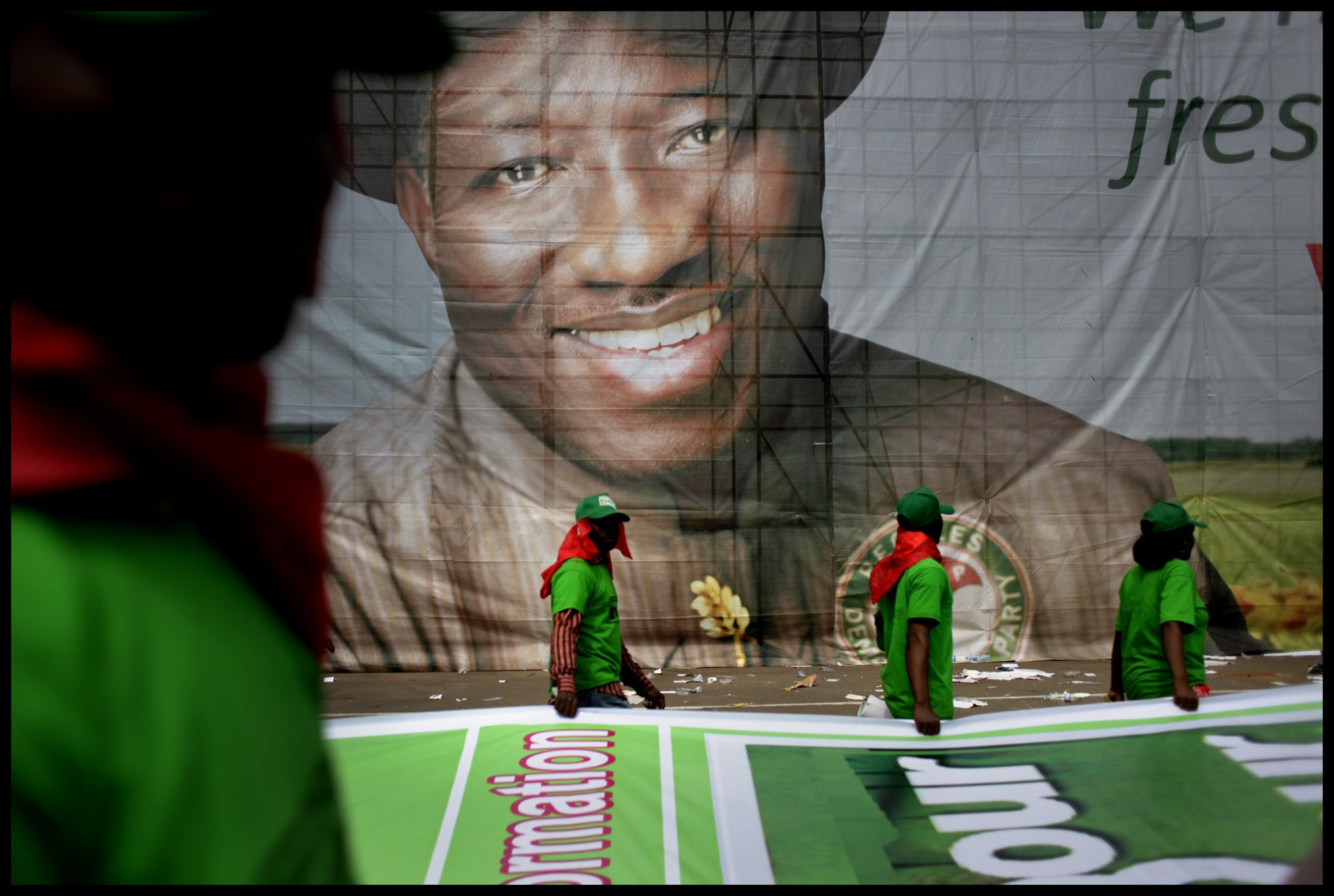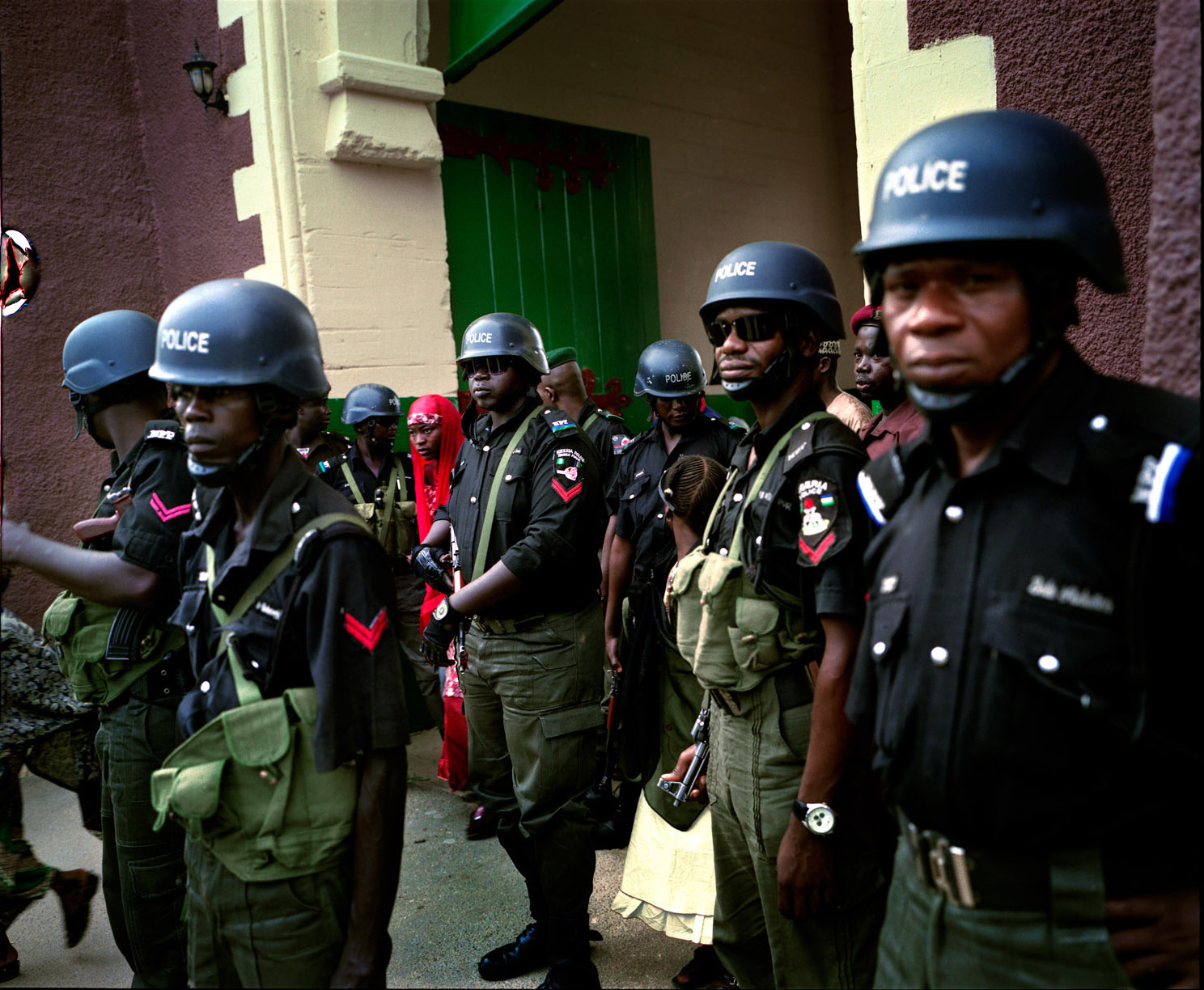
"We have started the journey. The Almighty will see us through," says the man sitting next to me as our car pulls out of the parking lot. In the front seat, a young woman cracks open a book entitled, "The Key to a Successful Life." Chapter one: Prayer.
In Abuja, the capital, the bell tower of the National Church of Nigeria thrusts a giant concrete cross towards heaven, while a few hundred meters away, the harsh equatorial sunlight glints off the golden dome of the National Mosque. The two enormous structures dominate the city's skyline; an unfinished highway runs between them.
Abuja, a planned city of broad avenues and modern government ministry buildings, is a recent creation. Following independence, the Nigerian leadership sought to move the seat of government from the colonial seaside capital, Lagos, to a more central location that would signify the unity of the giant new nation. But the move also grew out of a pressing need for neutrality.
Nigeria is mind-bogglingly diverse, comprising some 250 ethnic groups each with differing languages, dialects, customs and traditional beliefs. The population is split more or less evenly between Muslims, who mainly live in the northern half of the country, and southern Christians.
Held together under British administration for three quarters of a century within arbitrarily drawn borders, long-standing regional tensions erupted soon after colonial rule ended in 1960. In 1967, the southeast, home to oil fields discovered a decade earlier, declared independence, a move that sparked the 30-month Biafran War in which over 1 million died. Three decades of northern dominated military dictatorship followed.
Today, Nigeria – Africas most populous nation – is performing delicate balancing act aimed at warding off a repeat of the conflict that nearly destroyed the country at its inception. And Abuja – a work in progress made up of building sites connected by thoroughfares still under construction – is the symbolic manifestation of that effort. The national church and mosque were among the citys first buildings.
Nigeria is one of the worlds most religious nations. According to a 2010 poll by the Pew Forum on Religion and Public Life, 98 percent of its 150 million citizens believe in God. And 87 percent attend weekly religious services.
God is everywhere. The license plate frame on a luxury Mercedes 4x4 bears the somewhat gruesome inscription "I am covered in the blood of Jesus Christ." At prayer times, Muslim taxi drivers kneel beside their battered cars directing prayers towards Mecca. Driving through a Christian neighborhood, streets are lined with seemingly incongruously named shops: De Blessed Law Electrical, Christ Ambassador Pharmacy and Divine Fish Market.
Asked why Nigerians believe so strongly in God, a Christian taxi driver appears, at first, puzzled by the question before responding, "God is life. God is truth. God is the way."
But if a strong belief in God is a common characteristic of nearly all Nigerians, it also has the potential to divide. Ninety-one percent of Nigerian Muslims and 76 percent of Christians say their religion is more important to them than their identity as Africans, Nigerians, or members of an ethnic group. Ninety-seven percent believe the Bible and Koran are the literal word of God. And nearly 90 percent would like to make their holy book the law of the land. Islamic Shariah law has already been incorporated into the legal systems of a majority of northern states, aggravating tensions with Christians in the south. And as religion has inevitably found its way in the countrys politics, the risks of division have only grown.
"It is because of Divine Providence that I stand before Nigerians today as the president," incumbent President Goodluck Jonathan, a Christian, declared during his opening statement at a recent presidential debate.
Debate is perhaps not an accurate description of the event. Jonathan stood alone on stage, flanked on either side by three empty podiums bearing rather redundant "vacant" signs. His three principle challengers, all of them Muslims from the north, boycotted.
General elections are being held over the course of three successive weekends this month. Following three previous elections marked by widespread fraud and violence, analysts view the polls as critical to the survival of the countrys nascent democracy. But early indicators are not encouraging.
Under a gentleman's agreement established following the end of military rule in 1999, Nigerias ruling Peoples Democratic Party planned to alternate its choice of presidential candidate – and by extension the presidency itself – between Muslims and Christians. Olusegun Obasanjo, a Christian from the south, held the post for eight years before handing over to Umaru YarAdua, his Muslim successor, in 2007.
But YarAdua died last year, leaving Jonathan, his vice-president, to finish out his term. Jonathans decision to run for the presidency and the PDPs backing of him have been seen by many in the north as an affront to regional and religious power-sharing, providing an additional, potentially explosive, ingredient to an already tense vote.
But the presidential race is just one of many in play this month. Im heading northeast out of Abuja on the road to Plateau State in Nigerias Middle Belt region: the current frontline of struggle between north and south, Muslims and Christians, that has killed more than 1,000 over the past 14 months.




